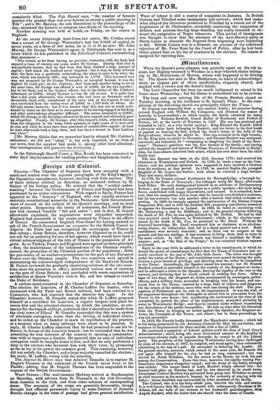lore* anb Colonial.
FRANCE.—The Chamber of Deputies have been occupied with a continued contest over the separate paragraphs of the Kines-speech ; the Opposition amendments, however, meeting with little success. One of these debates elicited, on Saturday, an animated defence by M. Guizot of his foreign policy. He averred that the " cordial under- standing" between the Governments of France and England had been purchased by no undue concessions. With regard to Spain, France had appealed to the " honesty " of England, who was equally anxious to maintain constitutional monarchy in the Peninsula : both Governments were of accord on the subject of the Queen's marriage, and on most other points. Respecting the treaty of commerce, the French Minis- ters bad retained freedom " full and entire"; and in fact, M. Guizot afterwards explained, the negotiations were altogether suspended. England had concurred in the course pursued by France in the affairs of Greece. He exonerated England from blame for having omitted to ask of the French Government an exeguatur for the British Consul in Algeria: the Porte had not recognized the sovereignty of France in that colony ; Great Britain, therefore, however disposed so to do, could not ask for an authority for one of her agents, which would have been a virtual acknowledgment of the title of France to the possession of Al- geria. As to Turkey, France and England were agreed on three principes —first, the maintenance of the independence of the Ottoman empire ; second, the protection of the Christian portion of the population ; third, the prevention of an exclusive protectorate on the part of any European Power over the Ottoman empire. The two countries were agreed in maintaining the acknowledged independence of the Sandwich Islands. M. Guizot reviewed the gradually improving relations of the two coun- tries since his accession to office ; mentioned various acts of courtesy on the part of Great Britain ; and concluded with warm expressions of satisfaction at Queen Victoria's visit to Eu, and her refusal to receive the Duke of Bordeaux.
A curious scene occurred in the Chamber of Deputies on Saturday. The election for Louviers, of M. Charles Laffitte the banker, who is connected with the Paris and Rouen railroad, had been referred to a
Committee, who had reported that the election was legal. In the Chamber, however, M. Grandin stated that when M. Laffitte proposed himself as a candidate for Louviers, a regular bargain took place be- tween him and the principal electors, by which the candidate, as con- tractor for the branch-railroad, undertook that it should not be made from the rival town of Elbeuf. M. Grandin contended that this was a system of wholesale corruption, worse than the bribing of individual voters ; and he called on the Chamber to mark its reprobation of the practice, at a moment when so many railways were about to be planned. In reply, M. Charles Laffitte admitted that he bad promised to use his in- fluence in favour of the Louviers branch ; but he contended that he was consulting the true interests of the country in opening a communica- tion with so important a district. He asserted that no case of individual corruption could be brought home to him, and that he only performed a duty to the electors who favoured him with their votes, by promoting as far as lay in his power the common good. This reasoning, however, did not satisfy the Chamber, and a large majority cancelled the election ; his uncle, M. Laffitte, voting with the minority.
The Journal du Havre says that Admiral Hamelin is to replace M. Dupetit Thouars in the command of the French naval force in the Pacific; adding, that M. Dupetit Thouars has been suspended at the request of the British Government.
WEST INDIES.—The mail-steamer Medway arrived at Southampton on Saturday, with advices from St. Thomas's to the 31st December, from Jamaica to the 25th, and from other colonies of corresponding dates. The accounts of the crops are generally favourable, though drought had effected permanent injury in some districts of Jamaica. Recent changes in the rates of postage had given general satisfaction.
Want of labour is still a source of complaint in Jamaica. In British Guiana and Trinidad some immigrants had arrived ; which had some- what allayed the bitterness produced in Trinidad by a recent act of the Legislature of St. Christopher, ostensibly restricting the emigration of debtors and persons leaving large families, but really intended to ob- struct the emigration of Negro labourers. This arrival of immigrants was thought to show that the attempts of the Anti-Slavery party at Sierra Leone to dissuade the Negroes from migrating were beginning to fail. British Guiana was in a ferment, on account of the continued rejection of Mr. Peter Rose by the Court of Policy, after he had been thrice placed first on the list of nominees by the electors. No reason is assigned for rejecting him.


























 Previous page
Previous page